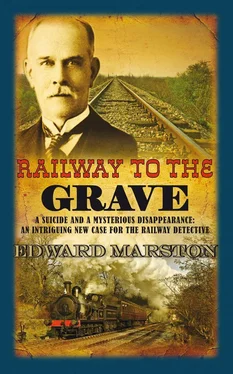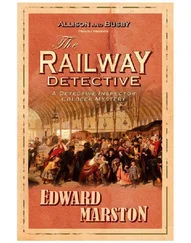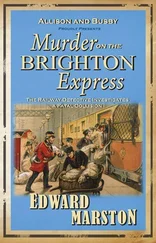Edward Marston - Railway to the Grave
Здесь есть возможность читать онлайн «Edward Marston - Railway to the Grave» весь текст электронной книги совершенно бесплатно (целиком полную версию без сокращений). В некоторых случаях можно слушать аудио, скачать через торрент в формате fb2 и присутствует краткое содержание. Жанр: Исторический детектив, на английском языке. Описание произведения, (предисловие) а так же отзывы посетителей доступны на портале библиотеки ЛибКат.
- Название:Railway to the Grave
- Автор:
- Жанр:
- Год:неизвестен
- ISBN:нет данных
- Рейтинг книги:5 / 5. Голосов: 1
-
Избранное:Добавить в избранное
- Отзывы:
-
Ваша оценка:
- 100
- 1
- 2
- 3
- 4
- 5
Railway to the Grave: краткое содержание, описание и аннотация
Предлагаем к чтению аннотацию, описание, краткое содержание или предисловие (зависит от того, что написал сам автор книги «Railway to the Grave»). Если вы не нашли необходимую информацию о книге — напишите в комментариях, мы постараемся отыскать её.
Railway to the Grave — читать онлайн бесплатно полную книгу (весь текст) целиком
Ниже представлен текст книги, разбитый по страницам. Система сохранения места последней прочитанной страницы, позволяет с удобством читать онлайн бесплатно книгу «Railway to the Grave», без необходимости каждый раз заново искать на чём Вы остановились. Поставьте закладку, и сможете в любой момент перейти на страницу, на которой закончили чтение.
Интервал:
Закладка:
‘He was a crusty old stick. He did some good things – giving to charity and suchlike – and I admire him for that. But I resented the way that he threw his weight around.’
‘So you think he’s a murderer, do you?’ said Leeming.
‘The honest answer is that I don’t know.’
‘What’s your guess?’
‘Oh, it’s a bit more than a guess,’ confided Hepworth, checking that nobody else was within earshot. ‘I have this theory, you see.’
‘Well?’
‘I don’t think that Mrs Tarleton is dead.’
‘Then where is she?’
‘Who knows? She’s a long way away, probably.’
‘That’s an interesting theory,’ said Colbeck. ‘Why did you take part in the search for a woman you thought had simply left the area?’
‘It was because of the way that the search was conducted by the colonel that I began to think. He made us go over and over the same ground as if he was trying to convince himself that she was there when, in his heart, he knew that she’d simply run away from him. That’s what played on his mind and drove him to suicide. He was too proud to admit that Mrs Tarleton had deserted him.’
‘Was he such a dreadful husband?’
‘All I can tell you is that he was difficult to live with.’
‘How do you know that?’
‘My daughter used to work at the big house.’
‘Ah, I see.’
‘Ginny was shocked when she first went there,’ said Hepworth. ‘The colonel and his wife had separate bedrooms. Ginny thought that was unnatural. It’s something my wife and I would never dream of doing. Married people should sleep together.’
‘That’s what I believe,’ said Leeming, stoutly.
Hepworth confided an intimate detail. ‘I wouldn’t get a wink of sleep without my wife beside me. I need to feel her there’
‘Separate bedrooms are not that unusual in some marriages,’ Colbeck pointed out, ‘and the arrangement may suit both partners. If one of them snores all night, for instance, I can imagine them sleeping apart, and there are lots of other innocent reasons why they might not wish to share a bed.’
Hepworth leant forward. ‘Ginny still thought it was odd.’
‘It’s downright peculiar,’ muttered Leeming.
‘What else did your daughter think was a little odd, Sergeant Hepworth?’ asked Colbeck.
‘Lots of things,’ said the other. ‘One of them was that the colonel and his wife didn’t seem to spend much time together. He was always out shooting, sitting on the bench in Northallerton or going off somewhere by train. And Mrs Tarleton was always visiting friends.’
‘I can’t see anything odd in that, Sergeant,’ said Colbeck. ‘You’ve just described a lot of marriages. Some couples prefer to rub along amiably instead of living in each other’s pockets. What I haven’t heard so far is any motive for desertion. When I was at the house earlier, the housekeeper was at pains to tell us that the colonel and his wife were devoted to each other.’
Hepworth curled a lip. ‘Mrs Withers would say that.’
‘You dispute the fact?’
‘My daughter does. Ginny heard them arguing more than once. She saw Mrs Tarleton run off to her room in tears one evening.’
‘Did she know why?’
‘She thinks so.’
‘What did she tell you?’
‘Ginny believes the argument was over Mrs Withers. My daughter was only a slip of a girl when she was there but she’s got sharp eyes and she senses things.’
‘And what did she sense?’
‘That something was going on between Mrs Withers and Colonel Tarleton. It was nothing she could put her finger on but it was sort of in the air, if you know what I mean.’
‘So there’s no actual proof of any attachment between them?’
‘There is now, Inspector.’
‘Well, I certainly don’t see it,’ said Leeming, scratching his head. ‘All you’ve told us so far is that your daughter senses things.’
‘She worked beside Mrs Withers every day.’
‘Did she actually catch the two of them together?’
‘No,’ conceded Hepworth, ‘not exactly.’
‘Then where is the evidence?’ pressed Colbeck.
‘It’s in the suicide, Inspector. That’s what gave him away. My belief is this. The colonel and Mrs Withers started carrying on together and his wife found out about it. When she could stand it no longer,’ said Hepworth, developing his theory, ‘Mrs Tarleton ran away and is probably living somewhere under an assumed name. To cover his shame, the colonel organised that long search for her when, all the time, he knew what had really happened. To a man of his standing, it must have come as a thunderbolt. Think of the scandal he’d have faced. Knowing that the truth was bound to come out one day,’ he concluded, ‘the colonel took his own life in order to escape the humiliation.’ Hepworth grinned and sat back as if expecting applause. ‘You see? I’ve solved the case for you. I can always work things out when I put my mind to it.’
The undertaker lived over the premises. He was annoyed when someone called so late that evening but was soon mollified by the information that his visitor was a senior detective from London. He conducted Tallis to the room where the coffin was resting on trestles. The lid was on it but had not yet been nailed down.
‘Do you really want to put yourself through this?’ he asked.
Tallis nodded. ‘He was my dear friend.’
‘Then you have my sympathy, sir.’
The undertaker removed the lid so that the corpse could be viewed. Even though herbs had been used to sweeten the atmosphere, the stench of death rose swiftly up into Tallis’s nostrils and made him retch. He gaped in horror. The shroud failed to conceal the broken limbs and the ugly distortions of the body, but it was the head that really shocked him. Colonel Tarleton’s face had been smashed to a pulp and the bare skull cracked apart. What dismayed Tallis, however, was something else. Head and body were quite separate. When the locomotive struck him with such force, his friend had been decapitated.
Closing his eyes to shut out the pain, Tallis began to pray.
CHAPTER FIVE
Sergeant Hepworth was a mine of information about the area but his comments about those who lived there were liberally salted with spite and prejudice. The inhabitants of the village and its neighbouring communities were either his friends or his enemies. There seemed to be no intermediate ground between the two groups. While they were grateful to learn so much from him, Colbeck and Leeming found his loquaciousness wearing and his pomposity irritating. When it was time for the railway policeman to leave, therefore, neither of them tried to detain him. They were glad to be left alone so that they could compare notes about what each of them had so far discovered. They were still deep in discussion when Tallis came in. He took only a few halting steps into the room then stood there with a look of utter bewilderment on his face as if he had no idea where he was. Colbeck beckoned him over.
‘Come and join us, Superintendent,’ he said, rising to his feet. ‘You look as if you might need a stiff drink, sir.’
‘Yes, yes,’ said Tallis. ‘Thank you, Colbeck.’
‘Brandy?’
‘Excellent.’
Colbeck went across to the bar counter and Tallis sat down at the table with Leeming. The superintendent still looked distracted. It was only when he’d taken a sip of the double brandy that was put before him that he came out of his reverie.
‘That’s better,’ he said.
‘You obviously viewed the body.’
‘I did.’
‘It must have been a gruesome experience,’ remarked Colbeck.
‘It was. I’d hate to have to go through that again.’
‘Why did you force yourself to do it, sir?’ asked Leeming.
Читать дальшеИнтервал:
Закладка:
Похожие книги на «Railway to the Grave»
Представляем Вашему вниманию похожие книги на «Railway to the Grave» списком для выбора. Мы отобрали схожую по названию и смыслу литературу в надежде предоставить читателям больше вариантов отыскать новые, интересные, ещё непрочитанные произведения.
Обсуждение, отзывы о книге «Railway to the Grave» и просто собственные мнения читателей. Оставьте ваши комментарии, напишите, что Вы думаете о произведении, его смысле или главных героях. Укажите что конкретно понравилось, а что нет, и почему Вы так считаете.












